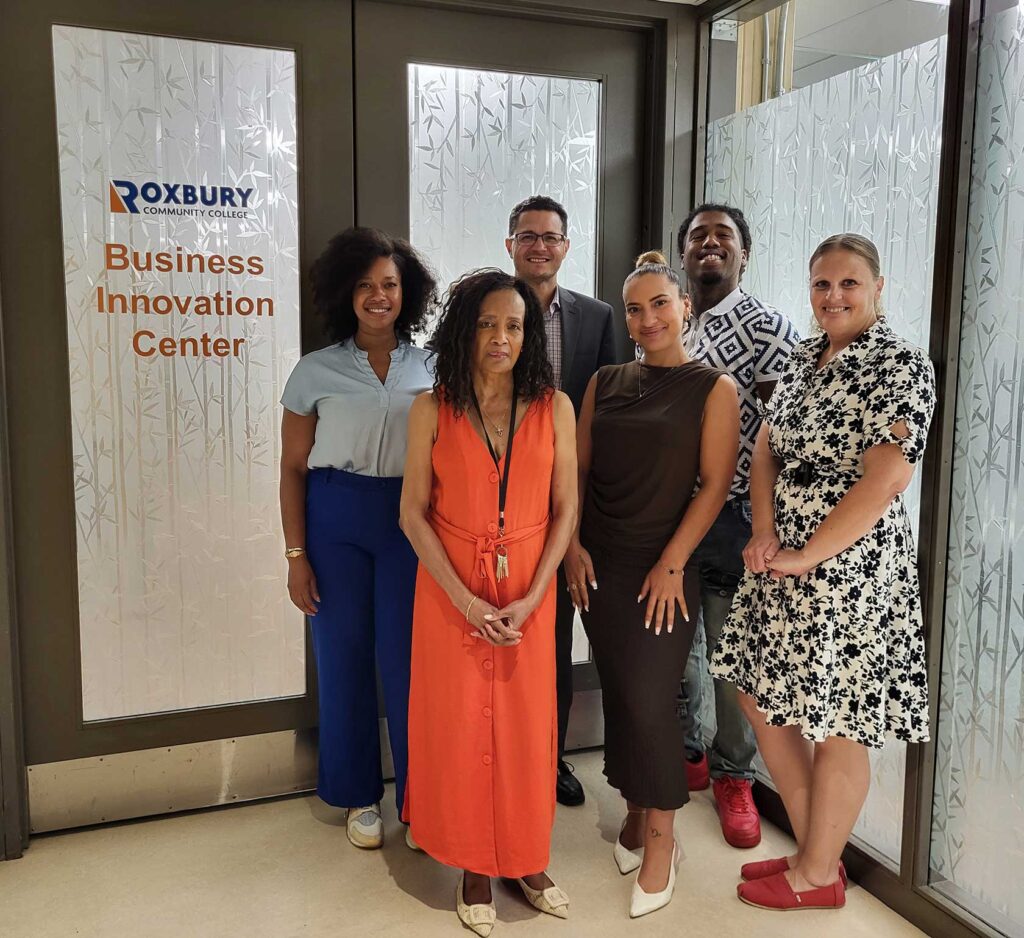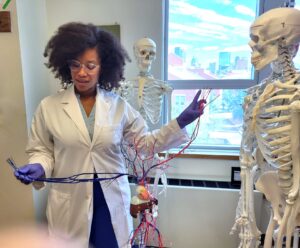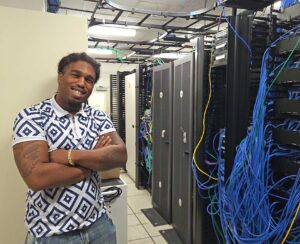
Banner Business Sponsored by The Boston Foundation
At Roxbury Community College, a new initiative is reimagining what a community college can be — not just a steppingstone to a degree, but a launchpad for economic mobility, small business ownership and systemic change. Open for just over a year, the Center for Economic and Social Justice (CESJ) is working to bridge the gap between education and opportunity for students and Boston’s communities of color, offering mentorship, career services and entrepreneurial support through a network of local partnerships.
CESJ helps students to earn life-sustaining wages by opening new career pathways and supporting small business ownership. The center helps advance systems change with its strategic partnerships, aiming to eliminate barriers and create equitable community growth for all. It oversees the Career and Internship Services and the Business Innovation Center at the college.
“The center was created because the systems that we have in place, by and large, haven’t been working. Boston is resource rich, but unfortunately the inequities continue to be worse than arguably ever before,” said Luciano Ramos, executive director for CESJ at RCC.
“We want to work across the spectrum, meet you where you’re at, support you and be a part of your team, because we feel it is a responsibility as a college,” he said. “We have access to networks, we have access to rooms in which a lot of our students, a lot of our community, have not been able to be invited into, and it is our job to hold that door open and be able to help support people getting into these different avenues.”
The Business Innovation Center (BIC) at RCC, opened in January this year, focuses on removing the structural barriers for startup small businesses.
“One of the core responsibilities of the Business Innovation Center, and any type of organization that [is] helping entrepreneurs launch and grow their businesses while focusing on building wealth, is to help guide people through the process and prevent them from going the wrong way,” said Edwidge Lafleur, director of the BIC at RCC.
BIC’s programs and partnerships aim to increase financial literacy and access to capital, foster mentorship, grow business networks, further business-friendly policies, and provide free, low-cost access to basic infrastructure and space.
They aim to provide a blueprint for helping students and the community succeed in starting a business.
“When you have 80% of all businesses that are started by a person of color failing in their first 18 months, compared to the national average of 20%, something is not working,” said Ramos. “We want to make sure that everybody knows that we are here to try to help create systems change. We’re here to try to remove those barriers and be that proof of concept that, yes, we actually can come together to create a system that works.”
The Business Innovation Center was made possible through the U.S. Department of Education’s Predominantly Black Institutions Program, which helped create the seed funding. Ramos explained that as the college grew and advanced, more funding for CESJ was received from partners like the Boston Foundation, Harvard and the Legacy of Slavery Initiative, the McMillan-Stewart Foundation, the New Commonwealth Fund and others.
“The BIC is not just for RCC students, it’s actually for the community and anybody who can participate in RCC. The ongoing support is some of the things that we do with the students who graduate, but also our community members,” said Shana Penna, program coordinator for the BIC.
Although CESJ at RCC is relatively new, opening just over a year ago, Ramos says that they have accomplished a lot through the help of their partners. “There’s a lot of incredible organizations that are in Boston, and we were never looking to reinvent the wheel. Everybody from Suffolk to Eastern Bank to the Small Business Administration to BECMA, we have a lot of really good partners who’ve stepped up.”
Through these partnerships, BIC can obtain the resources and connections in order to provide different programs and initiatives for its students and the community. “There are so many incredible organizations that provide different programs that we don’t,” said Penna. “We can partner with them; they can come in and help us. I think this is an all-hands-on deck thing, and the partnerships are the most important part of that [success].”

Brenda Maria Mena, RCC graduate and a STEM liaison at the college funded by CESJ, examines the venous system in a science classroom. She will attend Northeastern University in the fall continuing her studies in biology. PHOTO: ZHI ZHU
BIC primarily serves seven neighborhoods in Boston which include: Dorchester, Roxbury, Mattapan, Hyde Park, Roslindale, Jamaica Plain and South End. Roughly 85% of students attending RCC are from Roxbury, Dorchester, Mattapan and Hyde Park, said Ramos. “If you look at those four communities, we have the highest concentration of individuals who identify as Latino, Black or African American, people of color overall, the highest concentration in the city. Our seven neighborhoods combined, also make up 54% of all the individuals who have been identified as living in poverty.”
Ramos emphasizes that focusing on the students and the community by improving their outcomes after graduation is a way to achieve systemic change.
Brenda Maria Mena, a recent biology graduate at RCC who is planning to start a mobile phlebotomy and specimen collection business to help in preventative health care, explained that the college and BIC has been fundamental in providing her with the resources and opportunities to help plan her business. She added that the college helped provide her with the experiences through classes, internships and connections needed in her field. “None of those opportunities would have been available to me or would have happened if I didn’t come here to RCC and have the support system and the mentorship that was made available to me.”
Derek Goodwin, who also graduated from RCC with an information systems technology degree, hopes to create a business on educating seniors in using and understanding artificial intelligence to help them understand possible fraud. He explained BIC has provided students like himself the opportunity to start a business and give back to the community.
“If the school didn’t have the BIC, I probably wouldn’t even think about doing this business plan. I’d probably just think about applying for jobs on LinkedIn 24/7 [and] getting denied,” said Goodwin. “It gave me that little heat to keep going to just start that business [and] have a passion for what I’m doing.”
Across the country, community colleges are often associated with a stigma of being perceived to have lower prestige or as a less preferable fallback option in achieving higher education. Yet, for Mena and Goodwin, their experiences attending Roxbury Community College have been full of connection, opportunity and success. The programs provided by CESJ at RCC have been essential in shaping the development of what is possible with their students and the community, no matter their background.

Derek Goodwin, Information Systems Technology graduate at RCC who plans to attend Northeastern this fall to continue his IT degree, stands inside the server room at RCC where he had worked as a student. PHOTO: ZHI ZHU
“Our demographics as a workforce, as employees of the college, mirrors that of the community that we serve, and so do many of our experiences. I’m committed to this because I came from a very humble background, a family, working mother, single, we struggled with homelessness, we struggled with hunger,” said Ramos.
Mena explained that starting work at 13 years old helped her to understand the experiences of coming from humble beginnings and instilled in her a desire to give back to her community. “I hope with my business that I’m setting up [I will] be able to pay it forward at some point in time.”
When it comes to funding, RCC is facing challenges and uncertainty with resources, especially with the pending federal cuts towards education. But the Center is doing what they can to continue programs like BIC and more.
“There is the opportunity to balance out and to do as much as you can with what you have, and to become creative at identifying resources and ways to solve problems. The goal being to be able to provide the resources, to offer the program, to deliver new programs and to be there for the constituents, for the students, for the people in the community that need our work, that need our support,” said Lafleur.
Goodwin knows his business idea is something deeper than just another start-up. “Feels like I’m giving back to the community. I’m not doing this for money, it’s a hobby and I have a passion for it.”
Ramos explained that there is a sense of urgency for RCC to help people and drive for systems change in the community, especially at a time when the future can feel uncertain.
“There are things that are happening in this world that are beyond our control,” said Ramos. “If things continue down the path that they are, our students’ lives and the people who they’re connected to are going to be severely disrupted. The setbacks that I feel that we really face, are the ones that our community is facing day in and day out.”
Mena and Goodwin will resume their studies in biology and information technology at Northeastern University this fall. They plan to continue to collaborate and engage with BIC’s leaders as they move on from RCC to build their businesses and hopefully reinvest in their community someday.







